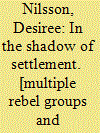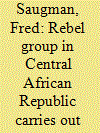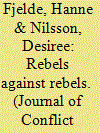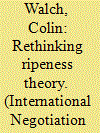|
|
|
Sort Order |
|
|
|
Items / Page
|
|
|
|
|
|
|
| Srl | Item |
| 1 |
ID:
075105


|
|
|
|
|
| Publication |
Uppsala, Department of Peace and Conflict Rsearch, 2006.
|
| Description |
viii, 145p.
|
| Series |
Report no. 73
|
| Standard Number |
9150618881
|
|
|
|
|
|
|
|
|
|
|
|
Copies: C:1/I:0,R:0,Q:0
Circulation
| Accession# | Call# | Current Location | Status | Policy | Location |
| 051952 | 355.0218/NIL 051952 | Main | On Shelf | General | |
|
|
|
|
| 2 |
ID:
148460


|
|
|
|
|
| Summary/Abstract |
This article discusses the case of the Allied Democratic Forces (ADF) rebel group in the Democratic Republic of Congo (DRC). It shows how a variety of actors that have opposed the ADF group have framed the rebels to achieve a range of political and economic objectives, or in response to organizational and individual limitations. The DRC and Ugandan governments have each framed ADF in pursuit of regional, international and national goals separate from their stated desires to eliminate the armed group. The UN stabilization mission in Congo's (MONUSCO) understanding of the ADF was influenced by organizational limitations and the shortcomings of individual analysts, producing flawed assessments and ineffective policy decisions. Indeed, the many ‘faces’ of ADF tell us more about the ADF's adversaries than they do about the rebels themselves. The article shows how the policies towards the ADF may not be directly related to defeating a rebel threat, but rather enable the framers (e.g. DRC and Ugandan governments) to pursue various political and economic objectives, or lead the framers to pursue misguided operational plans (e.g. MONUSCO). In doing so, the article highlights more broadly the importance of the production of knowledge on conflicts and rebel groups: the way in which a rebel group is instrumentalized, or in which organizational structure impact on the understanding of the rebel group, are crucial not only in understanding the context, but also in understanding the interventions on the ground.
|
|
|
|
|
|
|
|
|
|
|
|
|
|
|
|
| 3 |
ID:
137788


|
|
|
|
|
| Summary/Abstract |
A rich literature has developed focusing on the efficacy of peacekeeping operations (PKOs) in a temporal sense—asking whether the periods following a deployment are more peaceful or not. We know less about the efficacy of PKOs in a spatial sense. Can peacekeeping shape the geographic dispersion of particular episodes of violence? We posit that PKOs can contain conflict by decreasing the tactical advantage of mobility for the rebels, by obstructing the movement of armed actors, and by altering the ability for governments to seek and confront rebel actors. We investigate the observable implications using georeferenced conflict polygons from the Uppsala Conflict Data Program's (UCDP) Georeferenced Event Dataset (GED). Our findings confirm that PKOs tend to decrease movement in the conflict polygons, especially when robust forces are deployed and when rebel groups have strong ethnic ties. Our findings, on the one hand, imply that PKOs reduce the geographic scope of violence. On the other hand, PKOs may allow nonstate actors to gain strength and legitimacy and thus constitute an even greater future threat to the state whether some form of accord is not reached.
|
|
|
|
|
|
|
|
|
|
|
|
|
|
|
|
| 4 |
ID:
129212


|
|
|
| 5 |
ID:
113948


|
|
|
|
|
| Publication |
2012.
|
| Summary/Abstract |
Rebel groups that confront the government frequently become engaged in fierce and violent struggles with other groups. Why does a rebel group who is already fighting with the government become engaged in yet another struggle, thereby sacrificing scarce resources in the fight against other rebel groups? This article addresses this puzzle by providing the first global study on the determinants of interrebel violence. The authors argue that this violence should be understood as a means to secure material resources and political leverage that can help the group prevail in the conflict with the government. The quantitative analysis builds on new data on armed conflict between nonstate actors, 1989-2007. The results show that interrebel conflict is more likely when the rebel group fights in an area with drug cultivation, when the group is in control of territory beyond government reach, when the group is either militarily strong or weak in relation to other rebels, and where state authority is weak.
|
|
|
|
|
|
|
|
|
|
|
|
|
|
|
|
| 6 |
ID:
143900


|
|
|
|
|
| Summary/Abstract |
How can ripeness theory be extended to explain when and why parties remain at the negotiating table until an agreement is reached? Existing ripeness theory is crucial in understanding when conflicting parties consider negotiation as preferable to continued fighting. However, factors which may explain why parties stay at the negotiation table after the start of the negotiation process – that is, how the ripe moment is sustained until an agreement has been reached – are not well elaborated. This study seeks to extend ripeness theory and argues that organizationally fragmented rebel groups are less flexible to make concessions and unlikely to stay at the negotiation table until an agreement is reached, especially when there is a lack of cohesion between the military and political branches. This argument is explored through a structured focused comparison of the peace negotiations in Colombia and in the Philippines with communist rebel groups.
|
|
|
|
|
|
|
|
|
|
|
|
|
|
|
|
| 7 |
ID:
159748


|
|
|
|
|
| Summary/Abstract |
How do natural disasters affect rebel group recruitment? Some influential research to date suggests that natural disasters – by lowering the opportunity cost of joining an armed movement – are likely to facilitate rebel group recruitment. In contrast, this study argues that natural disasters can negatively affect rebel organization and their recruitment efforts. It posits that natural disasters may weaken rebel groups in two main interrelated ways: (1) by leading to acute scarcity for rebel combatants and supporters, weakening the rebel group’s organizational structure and supply lines, and (2) by increasing government and international presence in areas where the insurgents operate. Empirically, this article explores these suggested mechanisms in two cases of natural disasters in the Philippines (typhoons Bopha in 2012 and Haiyan in 2013), which affected regions partially controlled by the communist rebel group, the New People’s Army (NPA). Based on data from extensive fieldwork, there is no evidence suggesting a boom in rebel recruitment in the wake of the typhoons. Rather, the NPA was temporarily weakened following the tropical storms, significantly impacting the civil war dynamics in the Philippines.
|
|
|
|
|
|
|
|
|
|
|
|
|
|
|
|
|
|
|
|
|